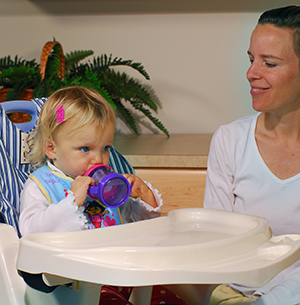When Your Child Has Diarrhea
Diarrhea is defined as loose poop that's more frequent and more watery than normal. Diarrhea can lead to the body losing too much fluid (dehydration), which can be serious. So preventing dehydration is important in managing your child’s diarrhea.
What causes diarrhea?
Diarrhea is not a disease but is a symptom of a number of illnesses. It may be caused by:
-
Gastroenteritis. Gastroenteritis is an infection of the bowel. It can be bacterial, viral, or parasitic infections (such as Salmonella, rotavirus, or Giardia). Viruses are the most common cause of gastroenteritis in children.
-
Food intolerances. Examples of these include dairy products.
-
Antibiotic-associated diarrhea. Some antibiotics affect the normal bacteria that live in the intestines. This causes diarrhea. Sometimes using antibiotics enables a dangerous bacteria, C. difficile, to multiply. Contact a doctor if your child on antibiotics has diarrhea that is severe, contains blood, or does not get better after the antibiotic is stopped.
-
Food poisoning. Rapid vomiting and diarrhea can happen within hours after eating the bad food. It's caused by toxins from germs growing in foods that are left out too long. Symptoms usually go away in less than 24 hours. It often can be treated at home without the need for medical care.
-
Other causes include intestinal illness such as Crohn’s disease, ulcerative colitis, and celiac disease.
What are common symptoms of diarrhea?
Common symptoms of diarrhea include:
-
Looser, more watery poop than normal.
-
More frequent poop than normal.
-
More urgent need to pass poop than normal.
-
Pain or spasms of the digestive tract.
How is diarrhea diagnosed?
The doctor examines your child. You’ll be asked about your child’s symptoms, health, and daily routine. The doctor may also order lab tests. These may include tests of your child's poop (stool studies) or blood tests. These tests can help find problems that may be causing your child’s diarrhea.
How is diarrhea treated?
 |
| Have your child drink plenty of fluids to prevent dehydration from diarrhea. |
Your child's doctor can talk with you about treatment choices. These may include:
-
Preventing dehydration by giving your child plenty of fluids (such as water). Infants may also be given a children’s electrolyte solution. Limit fruit juice, soda, and sports drinks. They have a lot of sugar.
-
Giving your child prescribed medicine to treat the cause of the diarrhea. Don't give your child antidiarrheal medicines unless told to by the doctor.
-
Eating starchy foods, such as cereal, crackers, or rice. Give food to your child in smaller, more frequent amounts. This can help reduce the risk of vomiting.
-
Removing certain foods from your child’s diet if they're causing the diarrhea. Your child may need to stay away from dairy products and foods high in fat or sugar until the diarrhea has passed. But most children can eat a regular diet, which will actually help them recover more quickly.
-
Infants can usually continue to breastfeed.
When to contact your child's doctor
Contact the doctor if your otherwise healthy child:
-
Has diarrhea that lasts longer than 3 days.
-
Has a fever (see "Fever and children" below).
-
Can't keep down any food or water.
-
Shows signs of dehydration (very dark or little urine, no tears when crying, dry mouth, or dizziness).
-
Has blood or pus in the poop or has black, tarry poop.
-
Looks or acts very sick.
-
Has belly pain that lasts or gets worse.
Fever and children
Use a digital thermometer to check your child’s temperature. Don’t use a mercury thermometer. There are different kinds and uses of digital thermometers. They include:
-
Rectal. For children younger than 3 years old, a rectal temperature is the most accurate.
-
Forehead (temporal). This works for children age 3 months and older. If a child under 3 months old has signs of illness, this can be used for a first pass. The doctor may want to confirm with a rectal temperature.
-
Ear (tympanic). Ear temperatures are accurate after 6 months of age, but not before.
-
Armpit (axillary). This is the least reliable but may be used for a first pass to check a child of any age with signs of illness. The doctor may want to confirm with a rectal temperature.
-
Mouth (oral). Don’t use a thermometer in your child’s mouth until they are at least 4 years old.
Use the rectal thermometer with care. Follow the product maker’s directions for correct use. Insert it gently. Label it and make sure it’s not used in the mouth. It may pass on germs from the stool. If you don’t feel OK using a rectal thermometer, ask the doctor what type to use instead. When you talk with any doctor about your child’s fever, tell them which type you used.
Below is when to call the doctor if your child has a fever. Your child’s doctor may give you different numbers for your child. Follow their instructions.
When to call a doctor about your child’s fever
Fever readings for a baby under 3 months old:
-
First, ask your child’s doctor how you should take the temperature.
-
Rectal or forehead: 100.4°F (38°C) or higher
-
Armpit: 99°F (37.2°C) or higher
-
A fever of ___________ as advised by the doctor
For a child age 3 months to 36 months (3 years):
-
Rectal or forehead: 102°F (38.9°C) or higher
-
Ear (only for use over age 6 months): 102°F (38.9°C) or higher
-
A fever of ___________ as advised by the doctor
In these cases:
-
Armpit temperature of 103°F (39.4°C) or higher in a child of any age
-
Temperature of 104°F (40°C) or higher in a child of any age
-
A fever of ___________ as advised by the doctor